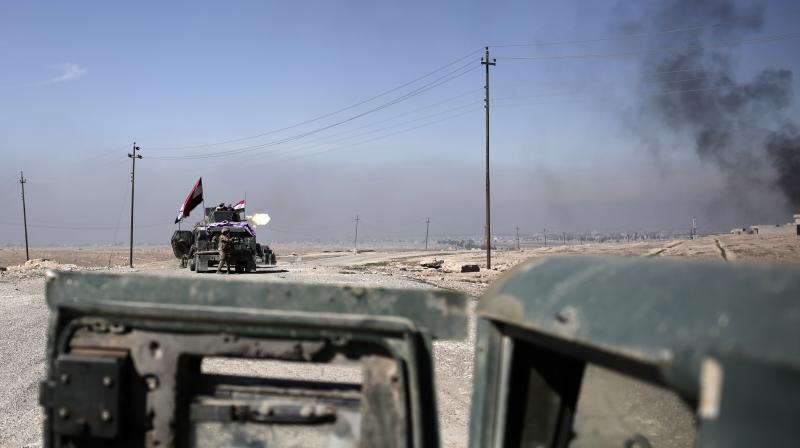Iraqi troops advance on western Mosul as Mattis holds talks

South of Mosul: Iraqi forces advanced Monday into the southern outskirts of Mosul on the second day of a push to drive Islamic State militants from the city's western half, as the visiting US defense secretary met with officials to discuss the fight against the extremists.
With aerial support from the US-led coalition, Iraqi police and army troops launched the offensive on Sunday, part of a 100-day-old campaign that has already driven the militants from the eastern half of the city.
Iraqi helicopters fired rockets at the village of Abu Saif early Monday, targeting a hill that overlooks the city's airport. By noon, the forces entered the village and gained control over much of the strategic hill as fighting was still raging.
Separately, militarized police in armored vehicles were moving toward the sprawling Ghazlani military base on the southwestern outskirts of the city.
A U.S.-led coalition has been providing close air support throughout the campaign to retake Iraq's second-largest city. U.S. special operations forces are embedded with some Iraqi units and thousands of U.S. troops are in Iraq providing logistical and other support.
Meanwhile, U.S. Secretary of Defense Jim Mattis was holding discussions with U.S. and Iraqi officials, a week before he is expected to present a new strategy to President Donald Trump for defeating the Islamic State group.
"We're going to make certain that we've got good situational awareness of what we face as we work together and fight alongside each other," Mattis told reporters traveling with him.
Trump has repeatedly vowed to eliminate the extremist group but has provided few details about how his approach might differ from that of the Obama administration, which had partnered with Syrian and Iraqi forces to drive IS out of several towns and cities.
The battle for western Mosul, the extremist group's last major urban bastion in Iraq, is expected to be the most daunting yet.
The streets are older and narrower in that sector of the city, which stretches west from the Tigris River, forcing Iraqi soldiers to leave the relative safety of their armored vehicles. The presence of up to 750,000 civilians also poses a challenge.
Two suicide car bombers struck army and paramilitary forces west of Mosul on Monday, killing and wounding a number of troops, two army officers said, without specifying the number of casualties. A third suicide car bomber was blown up before reaching the troops, they said, speaking on condition of anonymity because they were not authorized to brief the media.
IS claimed responsibility for two attacks in an online statement, saying the attackers were British and Iraqi.

